Overview
This article delves into the crucial steps and considerations that manufacturers must undertake to master supplement packaging services. It underscores the significance of selecting appropriate packaging solutions that not only safeguard products but also adhere to regulations and elevate brand visibility. This is particularly relevant in light of consumer preferences for sustainability and the imperative of quality assurance in fostering compliance and trust.
Introduction
In a market where first impressions can make or break a product, the significance of supplement packaging cannot be overstated. High-quality packaging not only safeguards the integrity of dietary supplements but also serves as a powerful marketing tool that communicates essential information and fosters consumer trust. As manufacturers strive to enhance brand visibility and meet regulatory standards, the challenge lies in navigating the complex landscape of packaging options and service providers.
How can manufacturers effectively master supplement packaging services to not only protect their products but also elevate their brand in a competitive marketplace?
Understand the Importance of Supplement Packaging Services
Supplement containers are essential in protecting products from environmental factors, ensuring compliance with regulatory standards, and enhancing brand visibility. High-quality containers not only preserve the integrity of dietary supplements but also effectively communicate crucial information to consumers, including usage instructions and health benefits.
Clear and organized nutrition labels foster trust and empower individuals to make informed choices, while visually appealing designs can forge emotional connections that influence purchasing decisions. Research shows that effective presentation can significantly impact consumer perceptions, making it a vital aspect of product marketing.
By investing in premium supplement packaging services, including cohesive graphic assets that elevate brand identity, manufacturers can enhance brand visibility, drive sales, and cultivate customer loyalty, ultimately contributing to long-term business success.
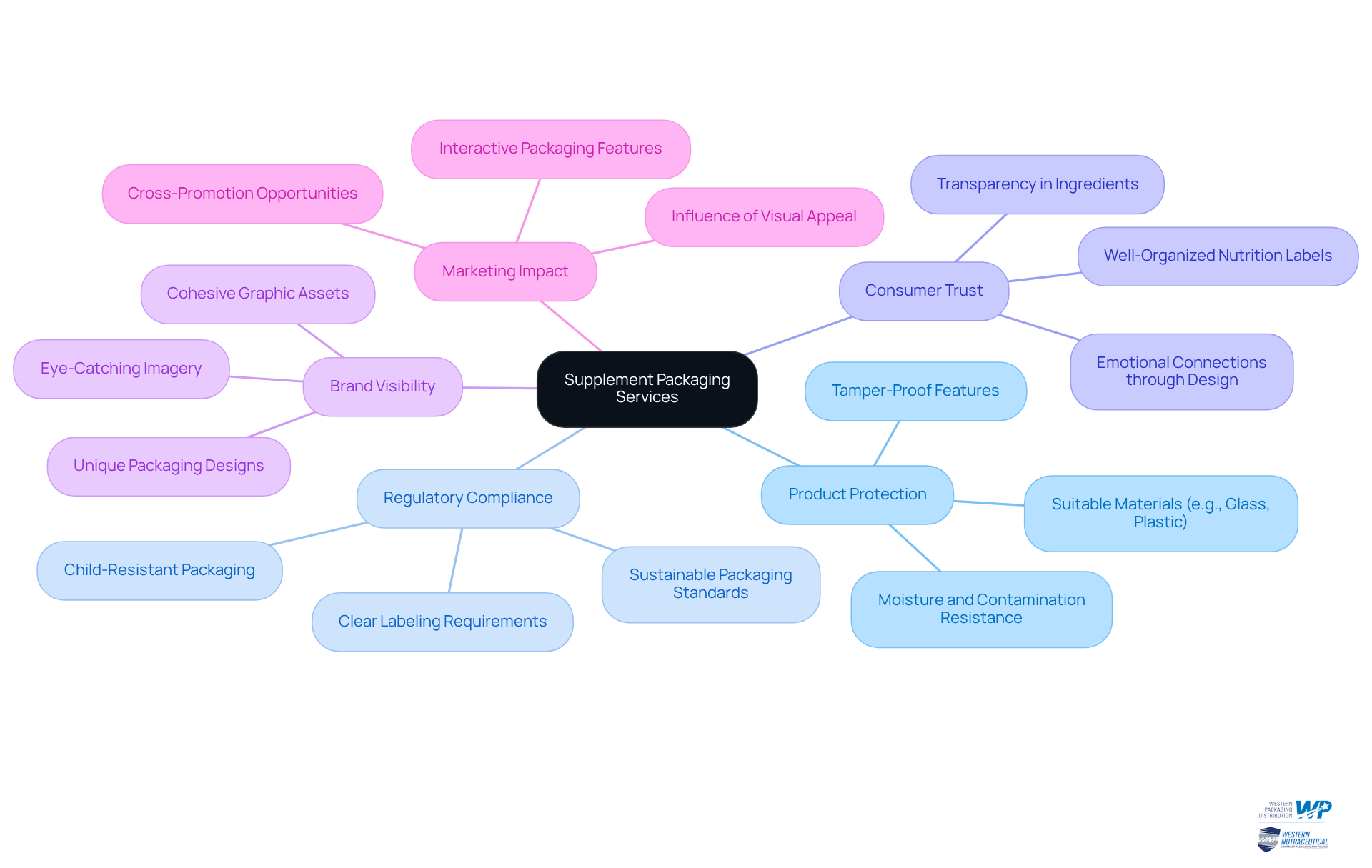
Identify Your Nutraceutical Packaging Needs
To effectively identify your nutraceutical packaging needs, consider the following factors:
-
Item Category: Various items, such as powders, capsules, or gummies, necessitate unique container solutions. Flexible containers are increasingly preferred for powders and gummies due to their versatility and affordability, while rigid formats, such as bottles, are chosen for capsules to maintain item integrity. Evaluate the physical attributes of your item to identify the most appropriate supplement packaging services for it.
-
Shelf Life: Assess the longevity of your item and select containers that offer sufficient defense against moisture, light, and air to preserve potency. Multi-layer containers can significantly extend shelf life; studies indicate a 30% increase for vitamin C products using advanced materials.
-
Target Audience: Understanding your target market's preferences is crucial. Approximately 60-70% of U.S. shoppers are willing to pay extra for eco-friendly materials, suggesting a strong demand for sustainable solutions that appeal to health-conscious individuals. Notably, 71% of respondents prefer flexible materials over rigid alternatives, highlighting a significant consumer trend towards eco-friendly choices.
-
Regulatory Requirements: Familiarize yourself with the container regulations specific to your product category to ensure compliance. For instance, the Therapeutic Goods Administration (TGA) supervises labeling and container standards for complementary medicines, which must be adhered to for market acceptance. This guarantees that your supplement packaging services comply with legal requirements and meet customer safety expectations.
-
Branding Goals: Consider how your design can reflect your brand identity and attract consumers on the shelf. Creative container solutions, such as minimalist designs with natural hues, can enhance visual attractiveness and brand awareness, helping your item stand out in a competitive market.
By thoroughly evaluating these factors, manufacturers can make informed choices about their supplement packaging services, ultimately enhancing product appeal and operational efficiency.
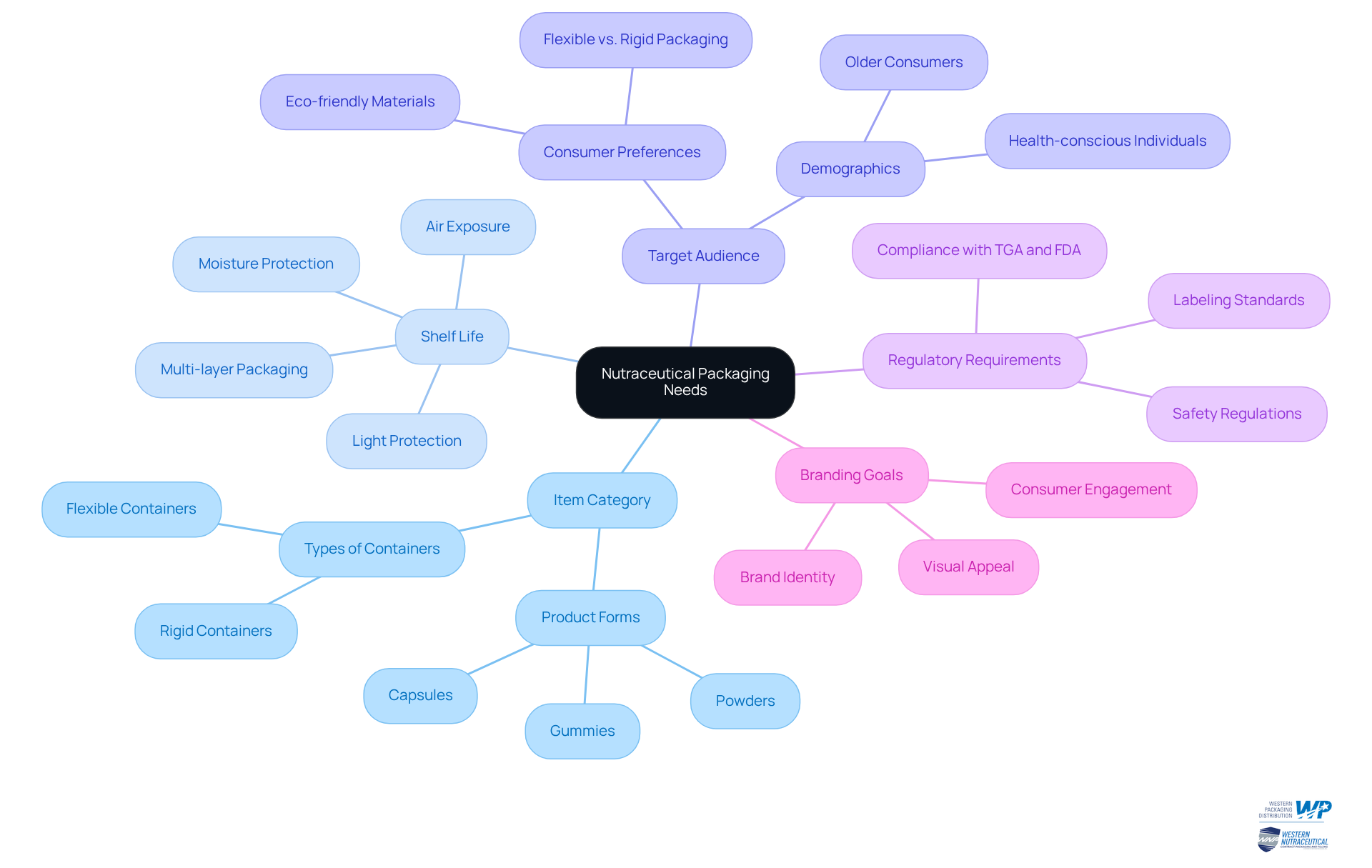
Evaluate Packaging Service Providers
When evaluating packaging service providers, it is essential to consider several critical criteria:
- Experience and Expertise: Seek out providers with a proven track record in the nutraceutical industry. Their experience can significantly influence the quality and compliance of your containers.
- Quality Assurance: Verify that the provider adheres to stringent quality control measures and industry standards, such as Good Manufacturing Practices (GMP).
- Customization Options: Assess the provider's ability to deliver personalized solutions that meet your specific item specifications and branding objectives.
- Technology and Innovation: Investigate whether the provider employs advanced container technologies that enhance efficiency and sustainability.
- Customer Support: Consider the level of customer service and support offered by the provider, as effective communication is vital for a successful partnership.
By thoughtfully evaluating these factors, manufacturers can select a service provider that offers supplement packaging services, aligning with their operational objectives and enhancing their product's market presence.
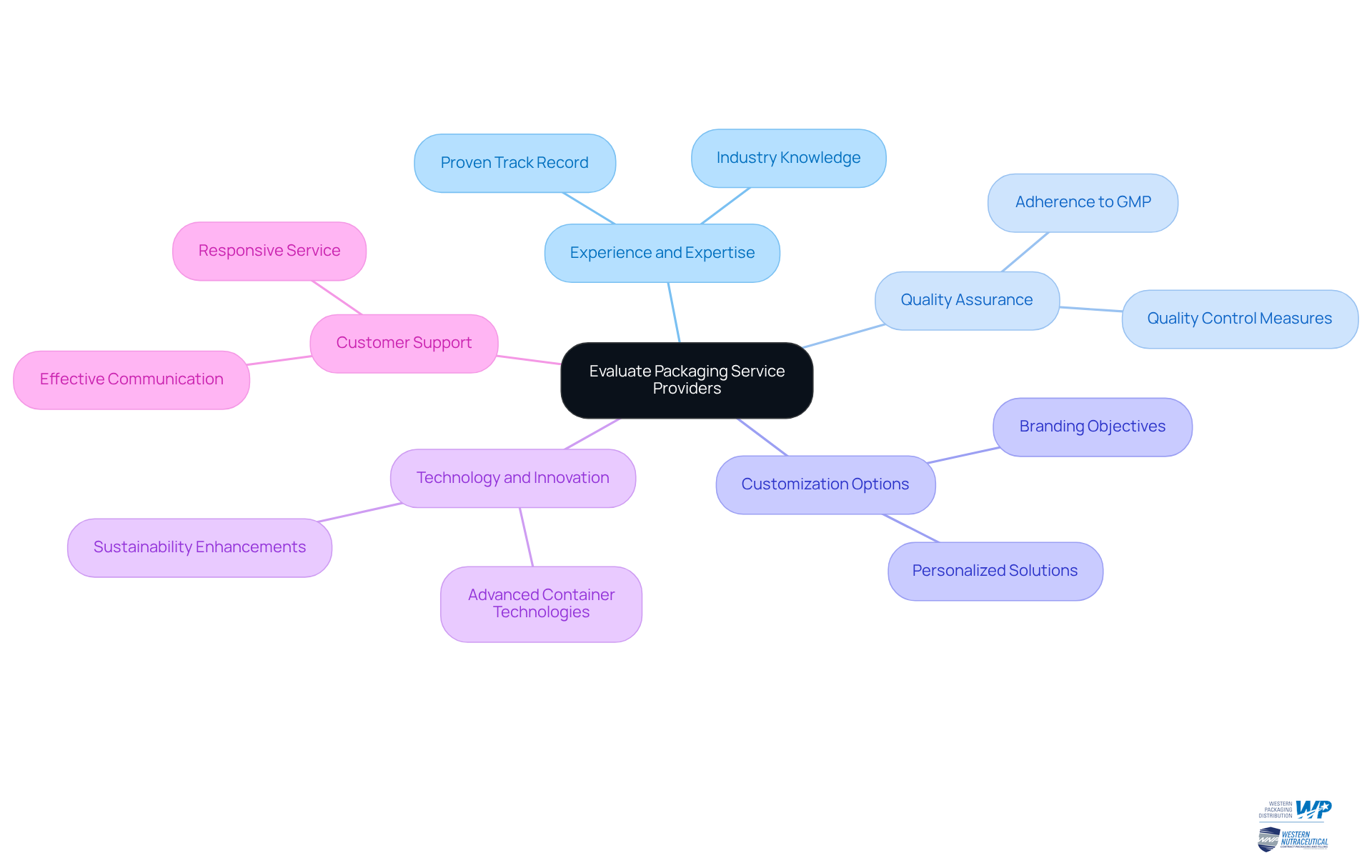
Ensure Compliance and Quality Standards
To ensure compliance and uphold quality standards in your supplement packaging, adhere to the following guidelines:
-
Understand Regulatory Requirements: Familiarize yourself with the regulations governing dietary supplements, including labeling requirements and packaging materials. The FDA outlines comprehensive guidelines that must be strictly followed to avoid penalties and ensure the safety of the items. This includes declaring known side effects, contraindications, and product interactions on labels.
-
Conduct Regular Audits: Implement routine evaluations of your wrapping processes to verify adherence to industry standards and internal quality control measures. Statistics indicate that companies that conduct frequent audits experience a significant reduction in compliance issues, enhancing overall operational efficiency.
-
Choose Approved Materials: Select containers that are approved for contact with food and dietary supplements. This is crucial to prevent contamination and ensure consumer safety, as improper materials can lead to serious health risks.
-
Document Processes: Maintain meticulous documentation of your packaging processes, including supplier certifications and quality control checks. This documentation is crucial for showing adherence during inspections and can significantly simplify the audit process.
-
Stay Updated: Regularly monitor changes in regulations and industry standards to ensure ongoing compliance. The FDA regularly revises its guidelines, and remaining informed enables manufacturers to adjust their labeling strategies proactively. Consulting with packaging experts can also help navigate material complexities and regulations effectively in the context of supplement packaging services.
-
Include Warning Statements: Ensure that your labels contain necessary cautionary messages, such as keeping items out of reach of children if they are inappropriate for them. This is an essential regulation that improves safety for users.
By prioritizing compliance and quality, manufacturers not only protect their products but also foster consumer trust, which is vital in the competitive nutraceutical market.
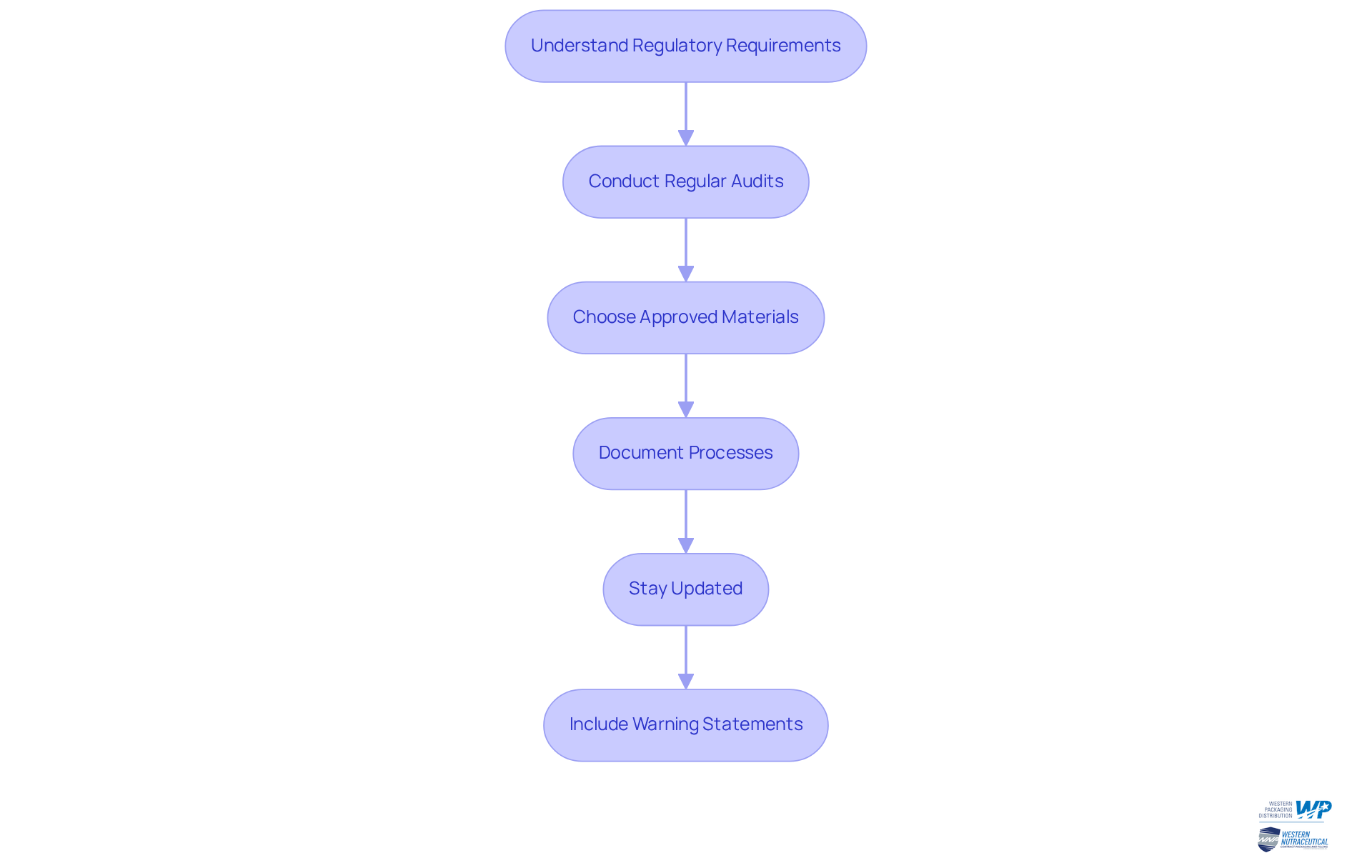
Consider Integrated Packaging and Logistics Solutions
When evaluating integrated packaging and logistics solutions, it is essential to consider the following key advantages:
-
Streamlined Operations: Integrated solutions facilitate seamless coordination between containerization and logistics, significantly reducing lead times and minimizing errors throughout the supply chain. This efficiency is crucial for maintaining a competitive edge in the fast-paced nutraceutical market.
-
Cost Efficiency: The merging of wrapping and logistics services enables manufacturers to achieve substantial cost reductions. For instance, CRC Logistics saved $32,717 annually due to an LED lighting upgrade, illustrating how integrated solutions can lead to significant financial benefits. By leveraging bulk purchasing and optimizing transportation routes, companies can reduce overall expenses, thereby enhancing their bottom line.
-
Enhanced Visibility: Integrated systems provide real-time tracking and visibility across the supply chain, which is vital for effective inventory management and accurate forecasting. This transparency allows manufacturers to respond swiftly to market demands and adjust their strategies accordingly.
-
Enhanced Customer Experience: A unified strategy for presentation and logistics ensures prompt deliveries and reliable product quality, which are essential for boosting customer satisfaction and nurturing loyalty in a competitive environment.
-
Sustainability: Many integrated solutions prioritize sustainable practices, such as utilizing eco-friendly materials and optimizing transportation routes. For example, the Kingsdown LED lighting upgrade resulted in a 69% reduction in annual lighting energy usage, showcasing how sustainability efforts can also lead to operational efficiencies. This focus not only reduces environmental impact but also resonates with environmentally conscious consumers, further strengthening brand reputation.
By embracing integrated packaging and logistics solutions, nutraceutical manufacturers can optimize their operations, achieve significant cost savings, and enhance their overall market competitiveness through supplement packaging services. As Orestes Monterrey, President, noted, "GreenTech’s ability to specify the needed upgrades in a precise fashion helped us gain a better idea of exactly what we were paying for," highlighting the importance of informed decision-making in operational improvements.
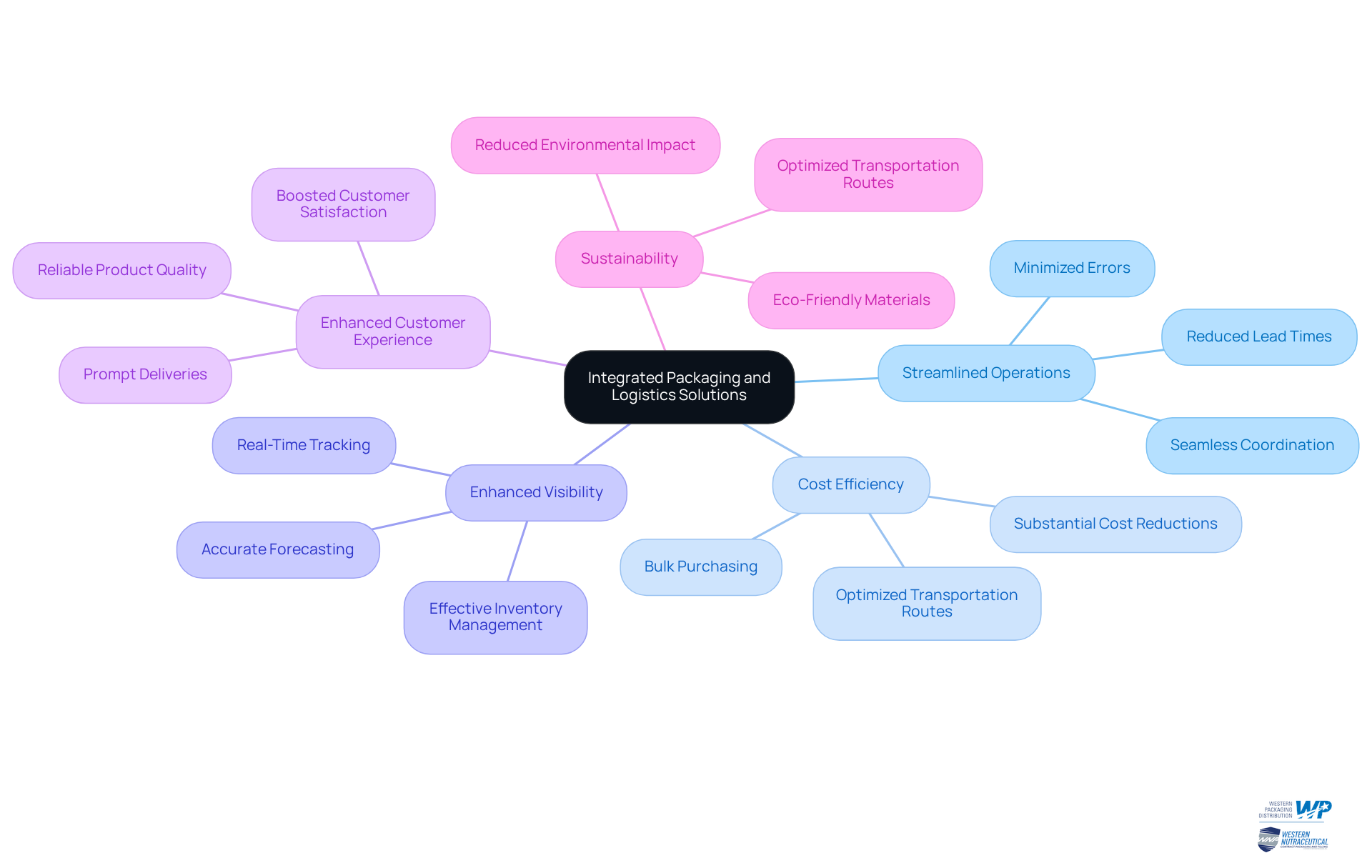
Conclusion
Supplement packaging services are crucial to the success of nutraceutical products, ensuring they are not only protected but also effectively marketed to consumers. The significance of high-quality packaging cannot be overstated; it safeguards product integrity, enhances brand visibility, and fosters consumer trust. By prioritizing thoughtful design and adhering to regulatory standards, manufacturers can significantly influence purchasing decisions and ultimately drive sales.
This guide has explored key aspects of supplement packaging, including:
- Identifying packaging needs based on item category
- Shelf life
- Target audience
- Branding goals
Evaluating packaging service providers is essential, as it ensures manufacturers select partners who meet quality assurance standards and can offer customized solutions. Furthermore, maintaining compliance with regulations and embracing integrated packaging and logistics solutions can streamline operations and enhance market competitiveness.
In conclusion, the importance of effective supplement packaging services extends beyond mere aesthetics; it is a critical factor in establishing a brand's reputation and ensuring consumer safety. As the nutraceutical market continues to evolve, manufacturers are encouraged to stay informed about current trends and best practices in packaging. By doing so, they can not only meet consumer demands but also position themselves for long-term success in a competitive landscape.
Frequently Asked Questions
Why is supplement packaging important?
Supplement packaging is essential for protecting products from environmental factors, ensuring regulatory compliance, and enhancing brand visibility. High-quality containers preserve the integrity of dietary supplements and effectively communicate important information to consumers.
What role do nutrition labels play in supplement packaging?
Clear and organized nutrition labels foster trust and empower consumers to make informed choices. They communicate usage instructions and health benefits, which are crucial for consumer understanding.
How can packaging influence consumer purchasing decisions?
Visually appealing designs can create emotional connections with consumers, significantly impacting their perceptions and purchasing decisions. Effective presentation is vital in product marketing.
What are some key factors to consider when identifying nutraceutical packaging needs?
Key factors include item category, shelf life, target audience, regulatory requirements, and branding goals. Each factor helps determine the most appropriate packaging solutions.
How does item category affect packaging choices?
Different item categories, such as powders, capsules, or gummies, require unique container solutions. Flexible containers are preferred for powders and gummies, while rigid formats like bottles are used for capsules to maintain item integrity.
What is the significance of shelf life in packaging?
Shelf life is crucial because it affects how long a product remains potent. Choosing containers that protect against moisture, light, and air can significantly extend shelf life, with studies showing a 30% increase for vitamin C products using advanced materials.
How does understanding the target audience impact packaging decisions?
Knowing the target market's preferences is vital. Many consumers are willing to pay extra for eco-friendly materials, indicating a demand for sustainable solutions that appeal to health-conscious individuals.
What regulatory requirements should manufacturers consider?
Manufacturers must familiarize themselves with container regulations specific to their product category to ensure compliance. For instance, the Therapeutic Goods Administration (TGA) oversees labeling and container standards for complementary medicines.
How can branding goals influence packaging design?
Packaging design should reflect brand identity and attract consumers. Creative solutions, such as minimalist designs with natural hues, can enhance visual attractiveness and brand awareness, helping products stand out in a competitive market.




